2023 年湖南益阳中考英语真题及答案
考生注意: 1. 本学科试卷分试题卷和答题卡两部分;
2. 请将姓名、准考证号等相关信息按要求填涂在答题卡上;
3. 请按答题卡上的注意事项在答题卡上作答, 答在试题卷上无效;
4. 本学科为闭卷考试, 考试时量为 90 分钟, 卷面满分为 120 分;
5. 考试结束后, 请将试题卷和答题卡一并交回;
6. 试卷中听力材料以中速朗读两遍; 选择题中最佳选项只有一个, 不选、多选、错选、涂
写不清楚, 均不给分。
试题卷
I 听力技能 (三个部分, 共 20 小题, 计 25 分)
A) 听音选图 (共 5 小题, 计 5 分)
根据你所听到的内容, 选择相应的图片。
1. A.
2. A.
3. A.
4. A.
B.
B.
B.
B.
5. A.
B.
B) 对话理解 (共 10 小题, 计 10 分)
C.
C.
C.
C.
C.
根据你所听到的对话以及针对该对话所提的问题, 选出能回答该问题的最佳答案听下面一
段对话, 回答第 6 小题。
6. What festival are they talking about?
A. The Spring Festival.
B. The Dragon Boat Festival.
C. The Mid-Autumn
Festival.
听下面一段对话, 回答第 7 小题。
7. What time does Li Lei usually get up?
�
A. At 6:00.
B. At 6:30.
C. At 7:30.
听下面一段对话, 回答第 8 小题。
8. Where did Bob go on vacation last summer?
A. To Mount Tai.
B. To the Great Wall.
C. To West Lake.
听下面一段对话, 回答第 9 小题
9. Who plays ping-pong once a week?
A. Su Mei.
B. Li Wen.
C. Chen Tao.
听下面一段对话, 回答第 10 小题。
10. What’s the relationship between Tom and Sam?
A. Cousins.
B. Brothers.
C. Classmates.
听下面一段对话, 回答第 11-12 小题。
11. Where are the lions from?
A. China.
B. Australia.
C. Africa.
12. What animals does the man like best?
A. Pandas.
B. Giraffes.
C. Lions.
听下面一段对话, 回答第 13-15 小题。
13. What is John going to have?
A. A class party.
B. A surprise party.
C. A birthday party.
14. When is the party?
A. On September 5th.
B. On October 5th.
C. On November 5th.
15. Why can NOT Sally come to the party?
A. Because she must go to a concert.
B. Because she will visit her grandparents.
C. Because she has to look after her little sister.
C) 听写 (共 5 小题, 计 10 分)
根据你所听到的内容, 完成下面的表格。(每空不超过三个单词)
Rules in students’ daily life
At school
Don’t ________ class. We must get to school on time.
Don’t ________ in class. We should listen to teachers carefully.
In the library
Don’t listen to ________. We must keep quiet.
Don’t throw rubbish everywhere.
________
We should do chores after school.
We can’t ________ on school nights.
II 知识运用 (两个部分, 计 20 分)
A) 单项填空 (共 10 小题, 计 10 分)
�
从 A、B、C 三个选项中选出一个可以填入空白处的最佳答案。
1. —Shall we play ________ soccer this afternoon?
—Sounds good, but I don’t have ________ soccer.
A. the; a
B. a; the
C. /; a
2. —Did you buy ________ special for your father on Father’s Day?
—Yes, I bought a pair of sports shoes for him.
A. something
B. anything
C. nothing
3. —Where’s Jenny? I can’t see her.
—Maybe she is hiding ________ the door.
A. under
B. between
C. behind
4. My aunt always eats healthily, so she looks ________ than she was two years ago.
A. young
B. younger
C. the youngest
5. —Are those Jim’s glasses?
—They ________ be Jim’s because he doesn’t wear glasses.
A. can’t
B. mustn’t
C. needn’t
6. —I’ve already visited the space museum. What about you?
—Me, too. I ________ there last year.
A. go
B. went
C. have gone
7. With the development of technology, computers ________ in class now.
A. use
B. used
C. are used
8. —Please give the Chinese book to Linda.
—OK. ________ I see her, I will give it to her.
A. As soon as
B. Unless
C. Before
9. —Why did you come to school so early today?
—Oh, I arrived here at 7: 00 ________ for the test.
A. prepare
B. preparing
C. to prepare
10. ________ beautiful Yiyang City is becoming! I’m sure the city will be better
and better.
A. How
B. What
C. What a
B) 完形填空 (共 10 小题, 计 10 分)
�
通读下面的短文,然后从短文后所给的 A、B、C 三个选项中选出最佳答案填空,使短文完整
通顺。
When I was five years old, I lived with my family in my grandma’s old house.
It was very old and small, but we were ___11___ there. We didn’t have a lot of money,
but we grew our own ___12___ to eat and made our own clothes.
Every day after school, I would ___13___ outside and wait for my dad to come
home from work. He worked on ___14___ all day for drivers. When he got home, he was
tired with oil on his hands. So the first thing he would do is to ___15___ his hands.
Then he sat in his old chair while mom and grandma were making dinner. After dinner,
I loved ___16___ onto his back and watching TV together. His hands were strong, and
I always felt ___17___ and loved.
Now I am 55 years old and the oldest person in my family. I have some health
problems, but I still remember those happy times with my dad ___18___. I wish I could
go back and sit with him in that old ___19___ one more time, just to ___20___ him
how much I love him and thank him for making me feel so happy and loved as a child.
11. A. lazy
12. A. food
13. A. sleep
14. A. radios
15. A. clean up
16. A. flying
17. A. angry
18. A. clearly
19. A. table
20. A. forget
B. happy
B. flowers
B. shout
B. cars
B. make up
B. walking
B. safe
B. sadly
B. bed
B. tell
C. right
C. trees
C. play
C. kites
C. look up
C. climbing
C. dangerous
C. slowly
C. chair
C. order
III 阅读技能 (三个部分, 计 50 分)
A) 选择 (共 15 小题, 计 30 分)
阅读下面三篇材料, 从每题所给 A、B、C 三个选项中选出最佳答案。
A
Many great projects in the world were completed by Chinese. Now let’s take a
�
look at some of them.
Beipanjiang Bridge
Shandan Junmachang Station
What is the world’s highest bridge? It’s
Shandan
Junmachang
Station
is
the
China’s Beipanjiang Bridge. Standing
world’s highest high-speed railway
over the Beipan River, it is 565 meters
station. It was built in Gansu province.
tall. It’s 1,341.4 meters long and 720
It stands at a sea level of 3, 108
meters wide. It connects Yunnan province
meters. The average temperature is
with Guizhou province.
around -4°C.
Daocheng Yading Airport
Zhegu Wind Farm
It lies in Sichuan province. It is the
It stands in the hills of the Himalayas
world’s highest airport. There are 1,145
in Tibet. That made it the world’s
small lakes around it, which are the result
highest wind farm. The farm has set an
of the movement of ancient glaciers (冰
example for high-altitude (海拔) wind
川).
power scientific research.
21. How tall is Beipanjiang Bridge?
A. 565 meters.
B. 720 meters.
C. 1,341.4 meters.
22. Mike wants to visit the world’s highest high-speed railway station. Where should
he go?
A. To Tibet.
B. To Gansu.
C. To Sichuan.
23. Why are there so many lakes around Daocheng Yading Airport?
A. Because of the high altitude.
B. Because of the cold weather there.
C. Because of the movement of ancient glaciers.
24. What project stands in the hills of the Himalayas?
A. Beipanjiang Bridge.
B. Shandan Junmachang Station. C. Zhegu Wind
Farm.
25. Where is the passage probably from?
A. A geography magazine.
B. A health book.
C. A movie ticket.
�
Our school is in the beautiful countryside near Dongting Lake. It is a tradition
of our school to let students work in the fields. By doing this, we can experience
B
the joy of farming.
The class is divided into six groups. Each group member has his or her own job
in the fields, such as watering plants, growing vegetables or clearing away grass
and so on. We’ve planted five different kinds of food: rice, corn, tomatoes,
potatoes and cabbages. The job is not easy. Each plant has its own needs. For example,
cabbages need more water, and we need to clear away the grass for the corn. But when
we ate our homegrown food, we felt very happy!
We not only farm outside but also study in the classroom about agriculture (农
业). For example, each group needs to choose a topic to research, such as “planting
according to the four seasons” or “agricultural production in ancient Chinese
poems”. Every two months, we can win prizes according to our team report and how
the plants have grown.
I really enjoy this kind of learning. I think our school tradition can make
students relax and let us know more about agriculture.
26. What is a tradition of the writer’s school?
A. To let students work in the fields.
B. To have students learn about farming at home.
C. To make students have dinner together outside.
27. What may each group member do in the fields?
A. Plant trees.
B. Sell plants.
C. Grow
vegetables.
28. How did the students feel when they ate their homegrown food?
A. Happy.
B. Bad.
C. Terrible.
29. How often can the students win prizes?
A. Every month.
B. Every two months.
C. Every three
months.
�
30. What does the writer think of their school tradition?
A. It’s not good for the students.
B. The students can learn nothing and feel tired of it.
C. It can make the students relax and know more about agriculture.
C
We have a saying that “filial piety (孝) is the first of the hundred virtues
(美德)”. So you know how important it is for Chinese to respect and take care of
their parents.
Our parents do so many things for us. They feed us, look after us and teach us.
It’s natural that we should feel thankful and want to pay them back. For teenagers,
filial piety means trying to make parents happy.
In China, many students usually do a lot to show filial piety, such as helping
wash parents’ feet, cooking for parents or writing a thank-you card. By doing these
things, we develop stronger love for our parents, which is great!
Confucius (孔子) believed that as long as everyone is good to their parents,
they can also be good to other people. Then there won’t be many fights. Then we
could bring peace to the world. I think this is a brilliant idea. It means that filial
piety is not only about loving your parents, but about loving everyone!
So I think we all should try our best to be good to our parents. Be there for
them when they feel lonely. Help them with housework. Give money to them when they
need it. These are all actions of the greatest kindness.
31. What does filial piety mean for teenagers according to the article?
A. Arguing with their parents. B. Trying to make parents happy. C. Asking their
parents for everything.
32. What do Chinese students usually do to show filial piety?
A. Cook for their parents.
B. Ask parents to wash their feet.
C. Finish
their homework by themselves.
33. What did Confucius believe?
A. We couldn’t bring peace to the world.
B. We should only be good to our parents.
�
C. We should love our parents and other people.
34. What does the underlined word “brilliant” probably mean in Chinese in Paragraph
4?
A. 荒谬的
B. 非凡的
C. 过分的
35. What’s the main idea of this passage?
A. Confucius was a great teacher.
B. Students should help parents do housework.
C. Filial piety is the first of the hundred virtues.
B) 摘录 (共 5 小题, 计 10 分)
阅读下面的材料,然后在表格中完成内容摘要,每空不超过三个单词。
Today’s students are really good at improving themselves online. Here are three
apps the students like using to help their study.
Duolingo
“I love using Duolingo to learn foreign languages. I’m using it to learn French,
while some of my classmates are learning Russian and Italian,” said 14-year-old
Zhang Qi from Tianjin. Students can learn foreign languages in a fun way by using
Duolingo. “The teachers are very cute cartoon characters. It makes the learning
process interesting,” he added.
wikiHow
Li Shuhe, a 14-year-old girl from Hunan, used wikiHow a lot. “This app has over
160,000 articles that teach you how to solve all kinds of problems, from fixing a
toilet to dealing with someone’s hurtful words. It even teaches you how to have
fun by yourself. I find it is quite creative and useful,” she said.
Douyin
Surprisingly, many students use Douyin to study today. Zhou Caiyan, a
15-year-old boy from Zhejiang, said, “I followed a Douyin account, which includes
all the important points of our biology lessons. Before the exam, I just spent one
hour reviewing those videos. Thanks to Douyin, I got the fourth place in my class
during the recent biology examination!”
�
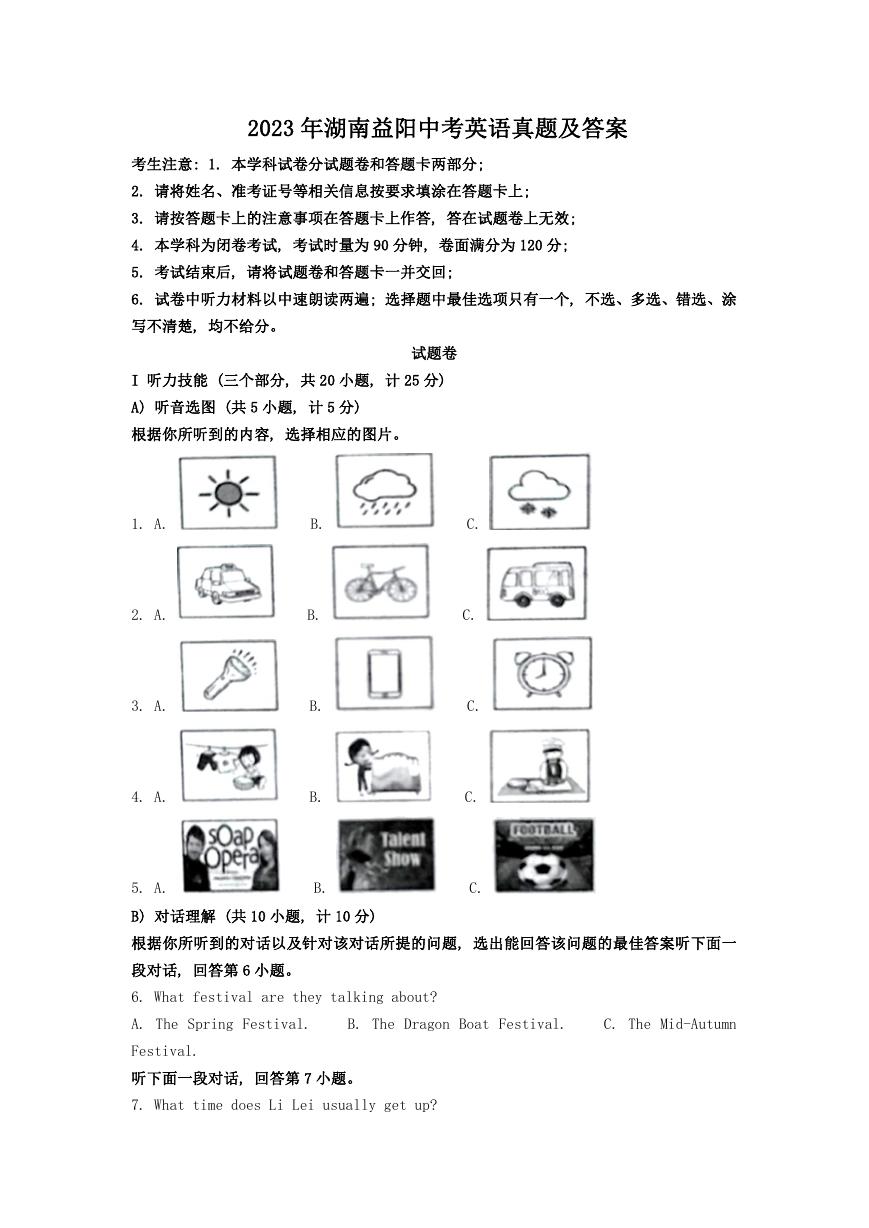
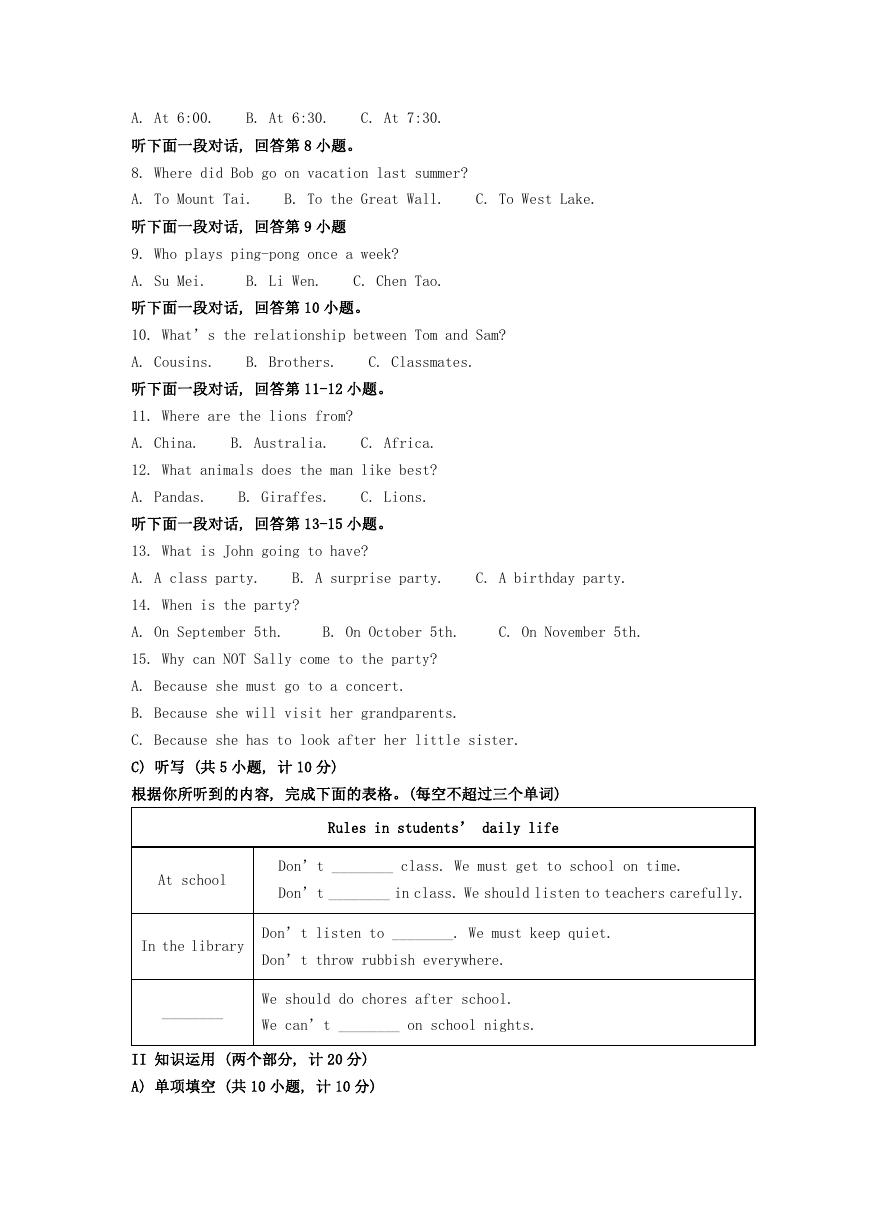
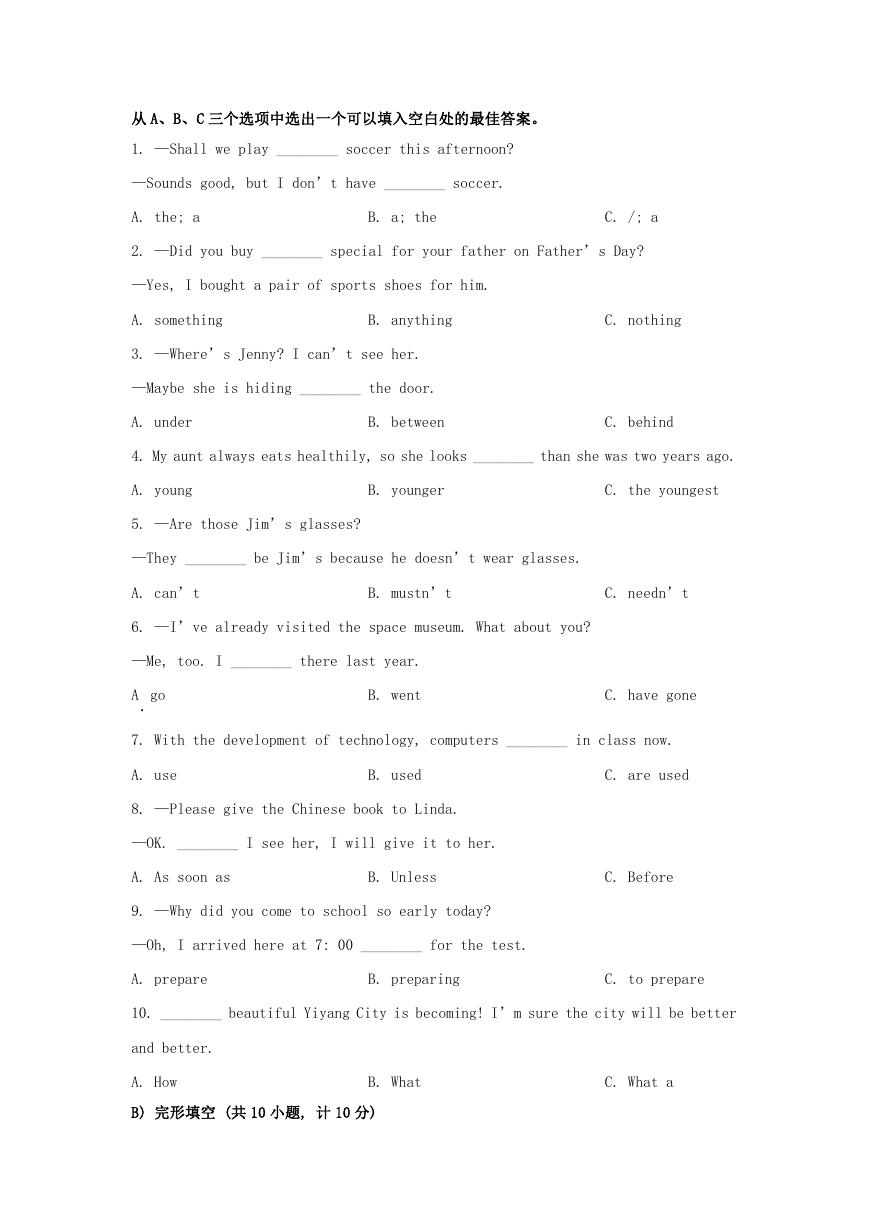
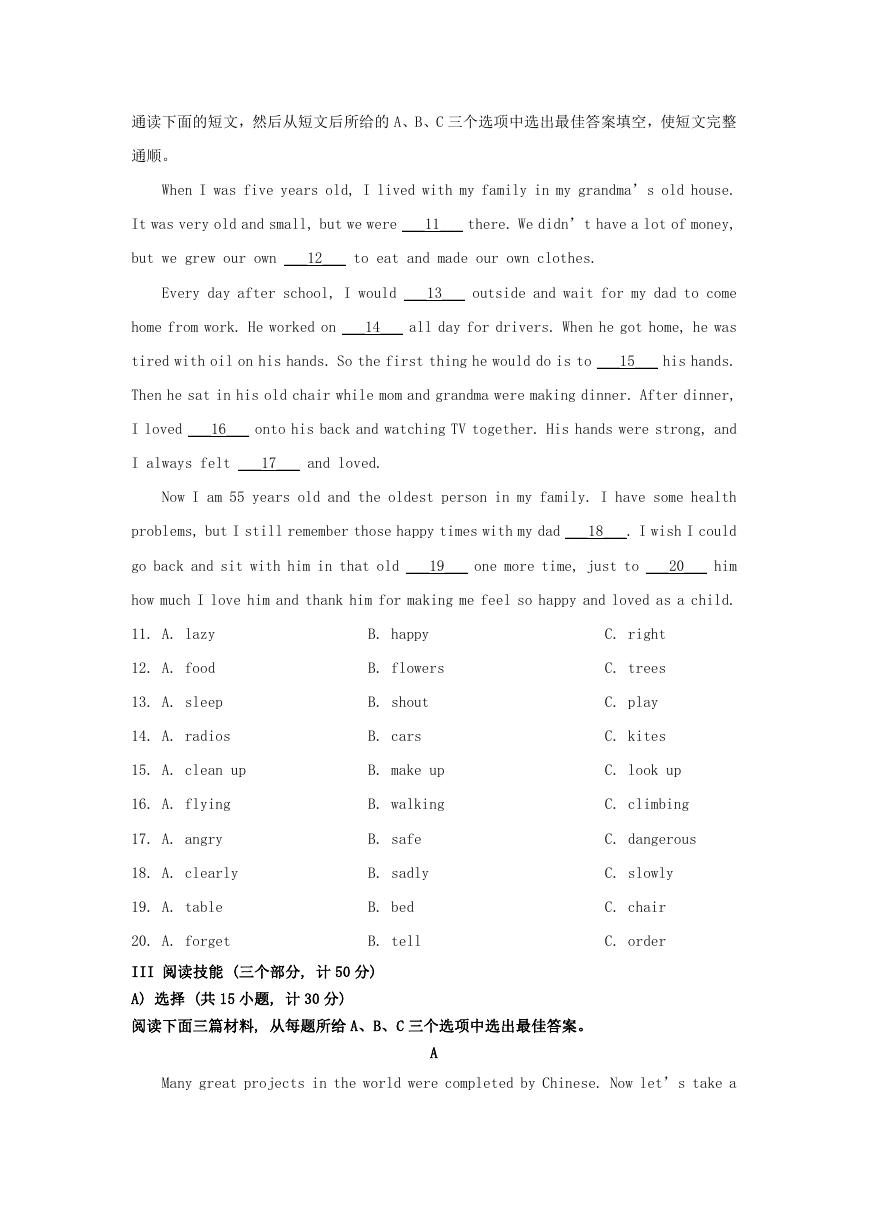
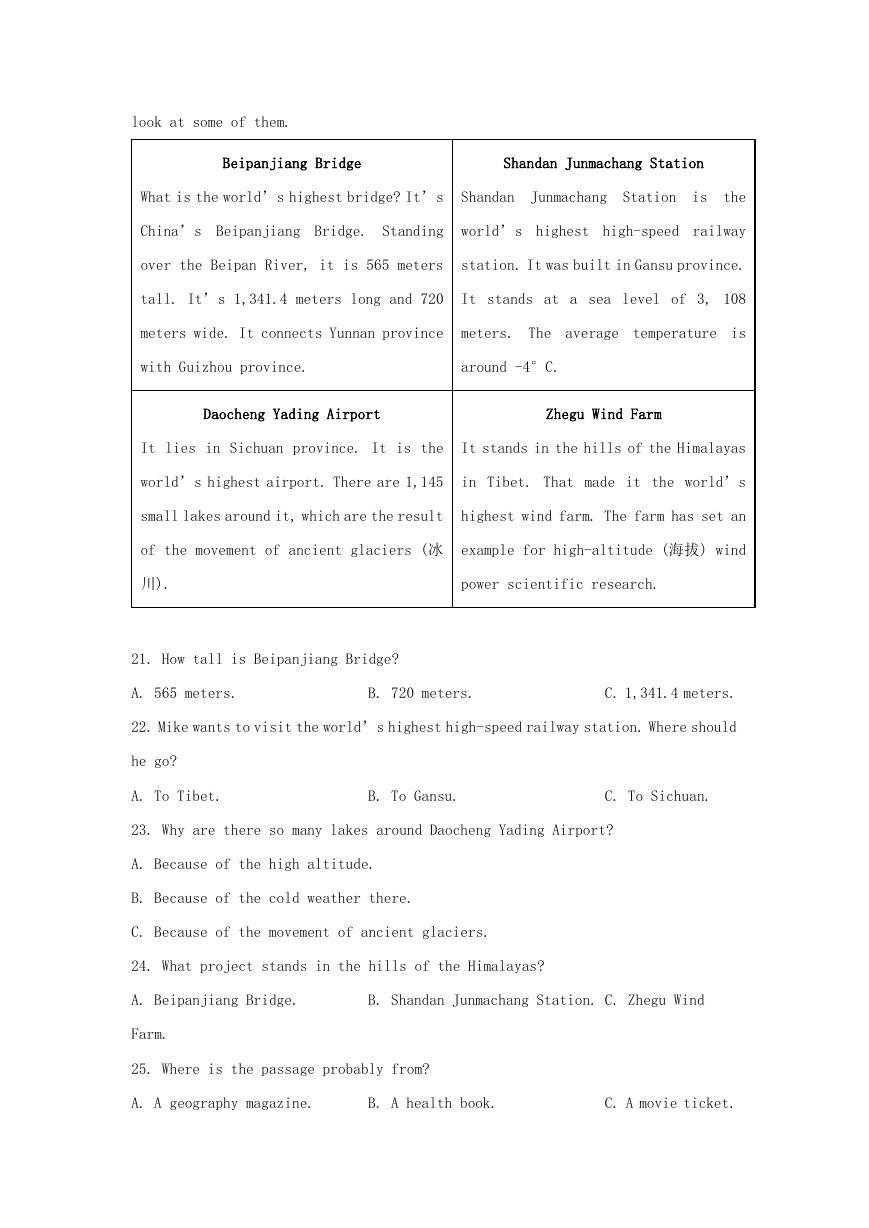
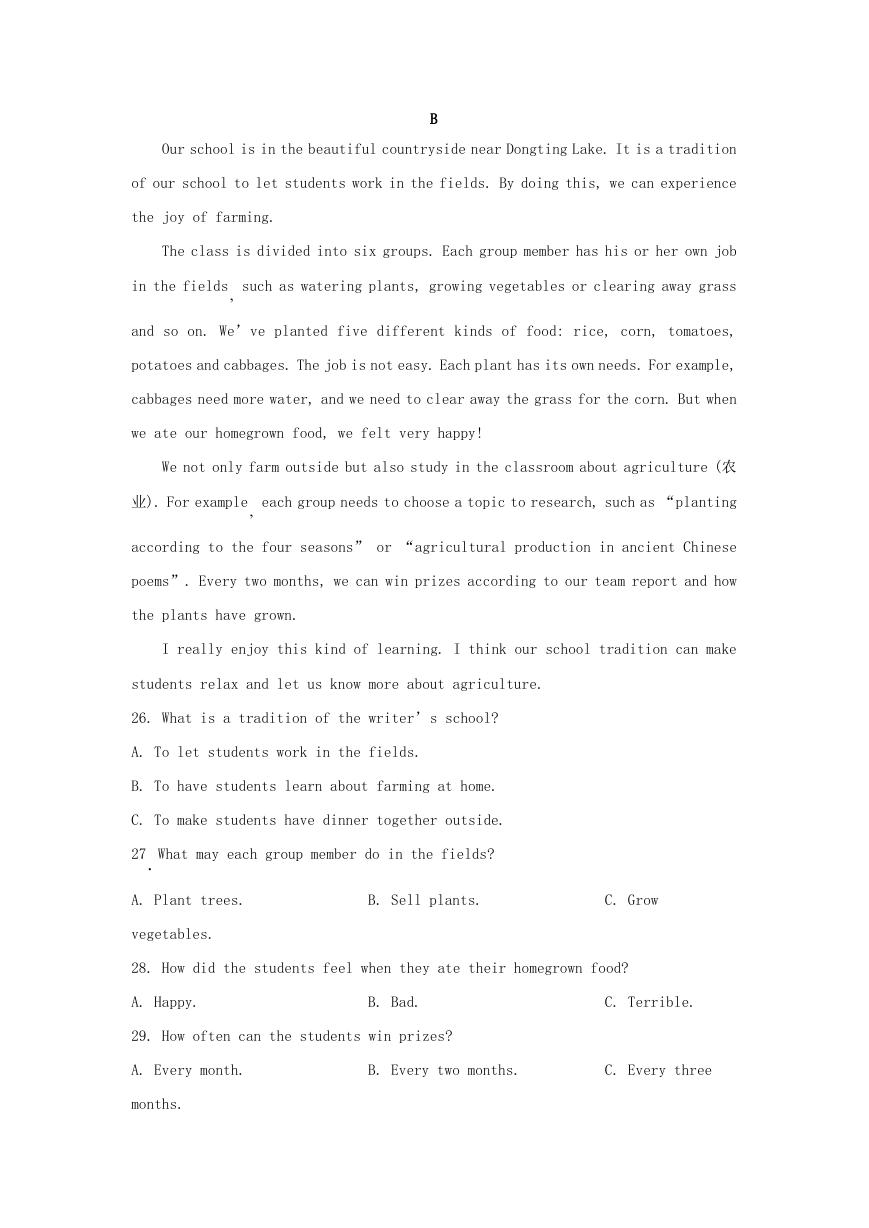
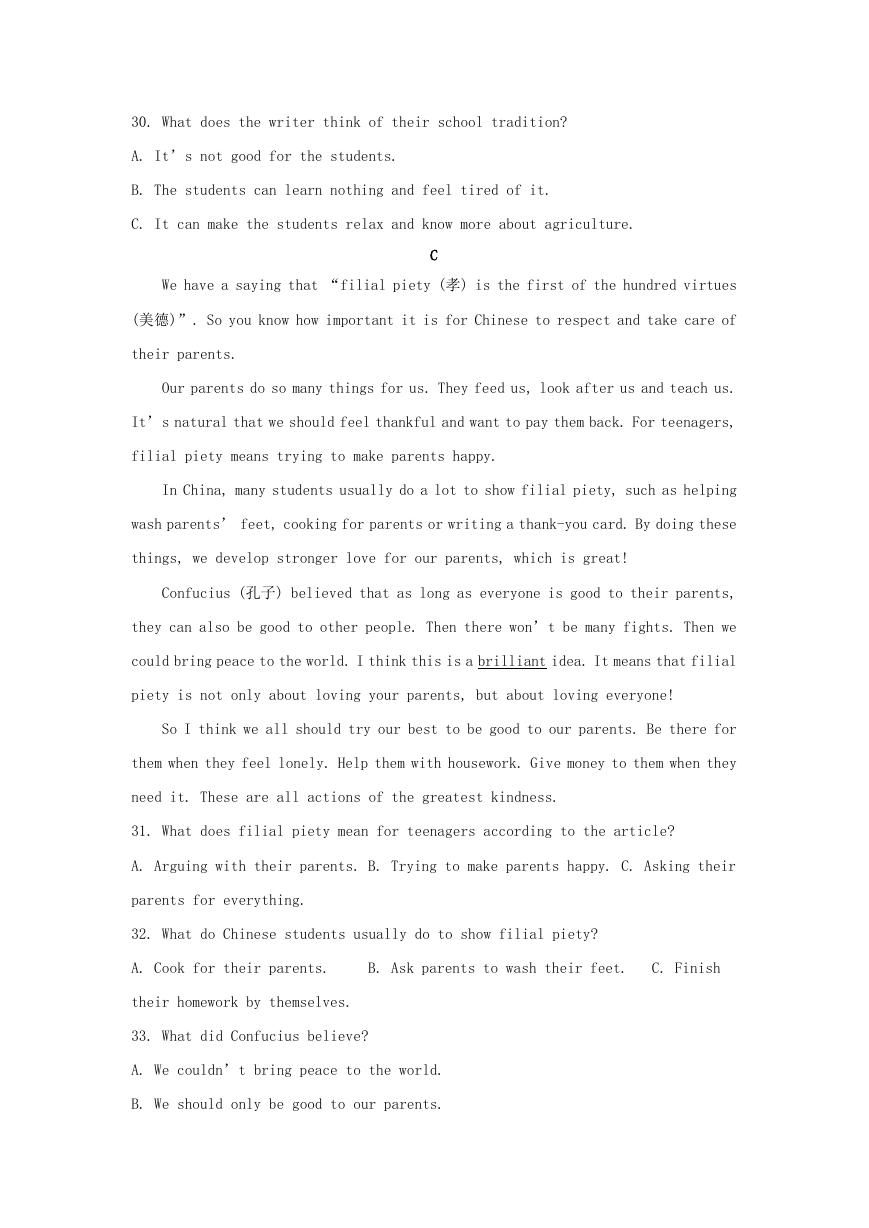
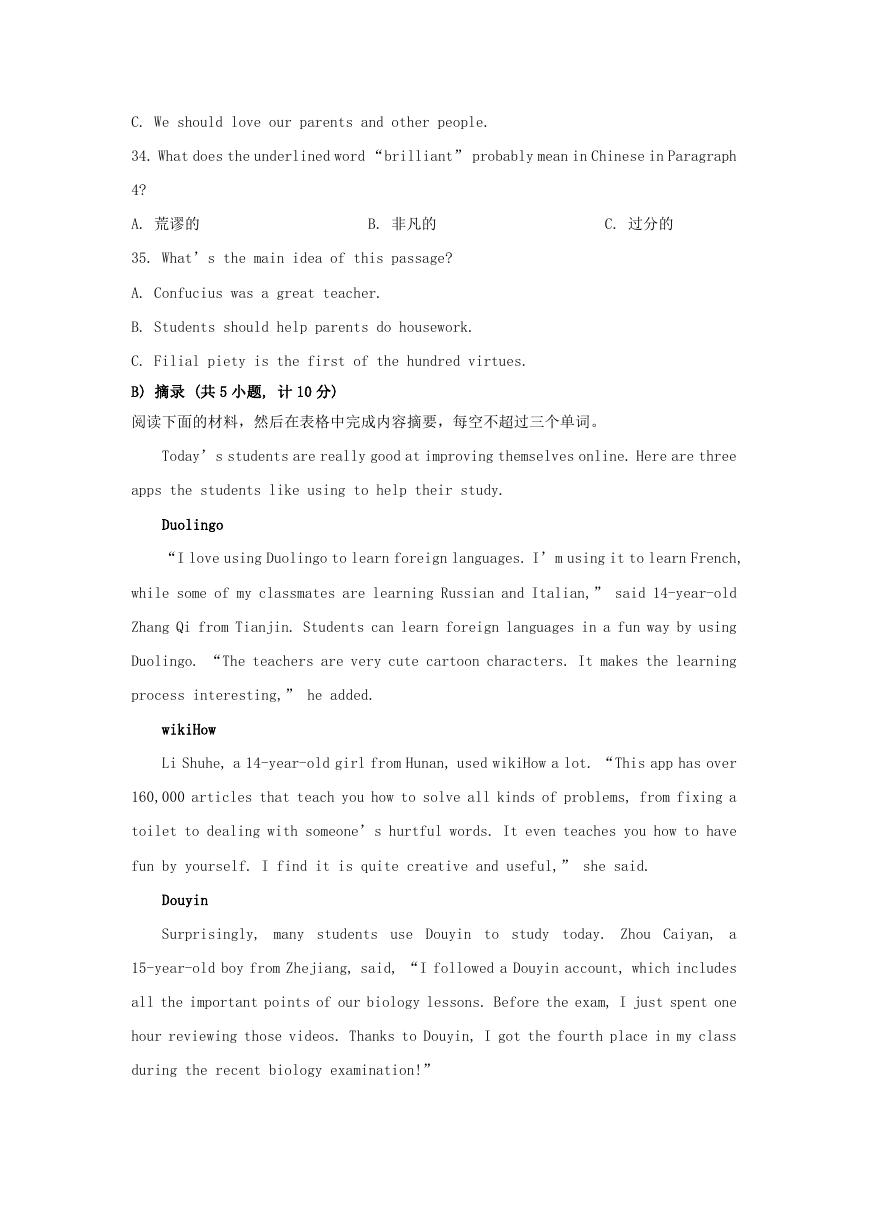








 2023年江西萍乡中考道德与法治真题及答案.doc
2023年江西萍乡中考道德与法治真题及答案.doc 2012年重庆南川中考生物真题及答案.doc
2012年重庆南川中考生物真题及答案.doc 2013年江西师范大学地理学综合及文艺理论基础考研真题.doc
2013年江西师范大学地理学综合及文艺理论基础考研真题.doc 2020年四川甘孜小升初语文真题及答案I卷.doc
2020年四川甘孜小升初语文真题及答案I卷.doc 2020年注册岩土工程师专业基础考试真题及答案.doc
2020年注册岩土工程师专业基础考试真题及答案.doc 2023-2024学年福建省厦门市九年级上学期数学月考试题及答案.doc
2023-2024学年福建省厦门市九年级上学期数学月考试题及答案.doc 2021-2022学年辽宁省沈阳市大东区九年级上学期语文期末试题及答案.doc
2021-2022学年辽宁省沈阳市大东区九年级上学期语文期末试题及答案.doc 2022-2023学年北京东城区初三第一学期物理期末试卷及答案.doc
2022-2023学年北京东城区初三第一学期物理期末试卷及答案.doc 2018上半年江西教师资格初中地理学科知识与教学能力真题及答案.doc
2018上半年江西教师资格初中地理学科知识与教学能力真题及答案.doc 2012年河北国家公务员申论考试真题及答案-省级.doc
2012年河北国家公务员申论考试真题及答案-省级.doc 2020-2021学年江苏省扬州市江都区邵樊片九年级上学期数学第一次质量检测试题及答案.doc
2020-2021学年江苏省扬州市江都区邵樊片九年级上学期数学第一次质量检测试题及答案.doc 2022下半年黑龙江教师资格证中学综合素质真题及答案.doc
2022下半年黑龙江教师资格证中学综合素质真题及答案.doc